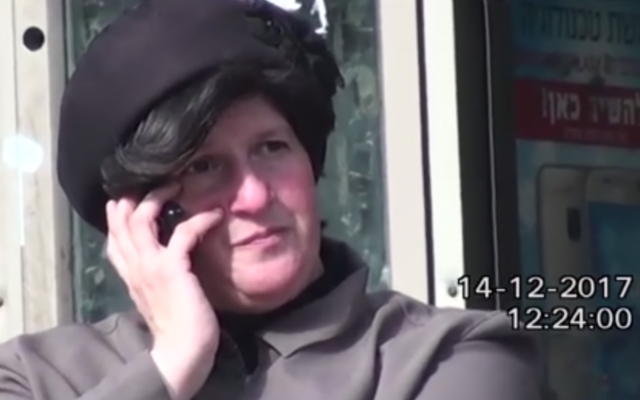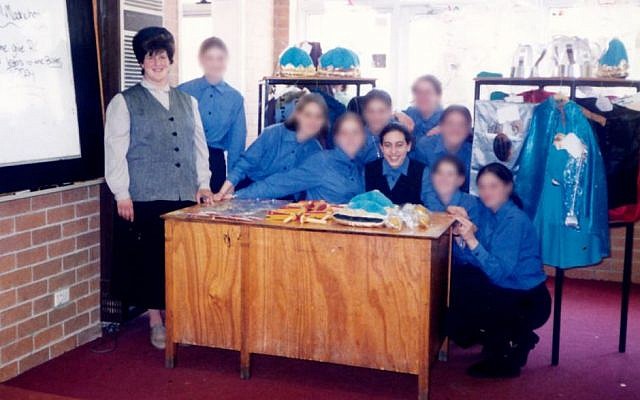Fraud claim against Leifer calls suspect's incompetency defense into question
The Times of Israel
Jacob Magid
13 May 2019
 A private investigator tagged Malka Leifer as she spoke on the phone, while sitting on a bench in Bnei Brak, on December 14, 2017. (Screen capture/YouTube)
A private investigator tagged Malka Leifer as she spoke on the phone, while sitting on a bench in Bnei Brak, on December 14, 2017. (Screen capture/YouTube)
Defense witness says former Australia principal accused of sexual abuse pretended to help her gather donations, but instead was pocketing checks
An ex-neighbor of accused sex abuser Malka Leifer said Sunday that the former headmistress claiming to be mentally unfit for extradition to Australia had run a scheme in which she fraudulently collected checks and stole money.
Naomi Tzubari was summoned to testify on behalf of the prosecution to demonstrate the degree of Leifer’s mental competence.
She alleged that, far from being an invalid, as the defense has claimed, Leifer both actively helped her raise money from a network of benefactors in Australia and managed to forge her signature to steal checks from her.
Leifer, an Israeli citizen, was ushered out of Australia back to Israel in 2008, days before allegations of sexual abuse against her surfaced, in a plan allegedly orchestrated by officials at the Adass Israel school where she taught.
Leifer has avoided extradition hearings by claiming to be stricken with an illness each time they come up.
But the defense has argued that Leifer has been feigning mental illness in order to prevent her continued jail time and extradition to Australia, where she faces 74 counts of sexual misconduct against her former students.
Tzubari, who was allowed to submit testimony in writing to the Jerusalem District Court for a hearing on Sunday, told The Times of Israel that Leifer had lived above her, in an apartment in the West Bank settlement of Emmanuel, roughly a decade ago, shortly after Liefer moved back to Israel.
An ex-neighbor of accused sex abuser Malka Leifer said Sunday that the former headmistress claiming to be mentally unfit for extradition to Australia had run a scheme in which she fraudulently collected checks and stole money.
Naomi Tzubari was summoned to testify on behalf of the prosecution to demonstrate the degree of Leifer’s mental competence.
She alleged that, far from being an invalid, as the defense has claimed, Leifer both actively helped her raise money from a network of benefactors in Australia and managed to forge her signature to steal checks from her.
Leifer, an Israeli citizen, was ushered out of Australia back to Israel in 2008, days before allegations of sexual abuse against her surfaced, in a plan allegedly orchestrated by officials at the Adass Israel school where she taught.
Leifer has avoided extradition hearings by claiming to be stricken with an illness each time they come up.
But the defense has argued that Leifer has been feigning mental illness in order to prevent her continued jail time and extradition to Australia, where she faces 74 counts of sexual misconduct against her former students.
Tzubari, who was allowed to submit testimony in writing to the Jerusalem District Court for a hearing on Sunday, told The Times of Israel that Leifer had lived above her, in an apartment in the West Bank settlement of Emmanuel, roughly a decade ago, shortly after Liefer moved back to Israel.
 The apartment building in the northern West Bank settlement of Emmanuel where Malka Leifer lived. (Jacob Magid/Times of Israel)
The apartment building in the northern West Bank settlement of Emmanuel where Malka Leifer lived. (Jacob Magid/Times of Israel)
Tzubari said that nine years ago, Leifer approached her, upon noticing that her neighbor had been going through financial hardship.
The prosecution witness claimed that the National Insurance Institute denied granting her disability funds even though she has not been able to work, due to injuries sustained in a 1991 terror attack.
“There are people that donate money from Australia that can help you,” Tzubari recalled Leifer having told her. “Just don’t tell anyone that I gave you [this money].”
“I didn’t feel that I had any reason to distrust her so I agreed [to let her help me],” the 59-year-old ultra-Orthodox woman said.
Tzubari began receiving regular checks sent in her name to the Emmanuel post office, and she became dependent on them, in order to make ends meet.
After several months, Leifer approached Tzubari asking if she could show her how she signed her name.
 Protesters demonstrate on March 13, 2019, outside the Jeursalem District Court during extradition hearings for Malka Leifer, a former girls school principal wanted for sexual abuse in Australia. (Yonatan Sindel/Flash90)
Protesters demonstrate on March 13, 2019, outside the Jeursalem District Court during extradition hearings for Malka Leifer, a former girls school principal wanted for sexual abuse in Australia. (Yonatan Sindel/Flash90)
While she admitted feeling odd about the request, Tzubari said she complied, telling herself that Leifer had only been trying to help.
From that point on, however, Tzubari stopped receiving the checks.
“I asked her where the donations were and she just told me that they hadn’t come,” the mother of six recalled.
When she approached Leifer several months later, Tzubari said her upstairs neighbor gave her a few shekels and told her there would not be anymore donations.
“I went to the post office shortly thereafter and was told I had received plenty of checks, but that someone had already signed for them,” Tzubari said.
 Adass Israel ultra-Orthodox girls school headmistress Malka Leifer (left) with her students, among them Nicole Meyer (center) in 2003. (Courtesy)
Adass Israel ultra-Orthodox girls school headmistress Malka Leifer (left) with her students, among them Nicole Meyer (center) in 2003. (Courtesy)
The woman added that when she approached Leifer about the issue, the former principal said that her husband was friends with the owner of the post office and that Tzubari would never be able to receive her checks.
Tzubari said that she reported the matter to the police, but that nothing was done.
“The state has ignored me and then this happened to me on top of it,” Tzubari said on the verge of tears.
It was not immediately clear where the checks had come from, but the scheme would appear to show that Leifer had maintained a support system in Australia whom she could draw on for funds, and was competent enough to tap into the system for herself and others.
Leifer’s attorney Yehuda Fried told The Times of Israel that he had not yet read Tzubari’s testimony and therefore could not comment on the specifics.
However, the lawyer said that his client’s “debilitated” state — which he has argued warrants her release from prison and cessation of extradition hearings — is not a constant reality; but rather something that Leifer “falls into during stressful situations.”
 Malka Leifer’s attorney Yehuda Fried (L) speaks with her brother at the Jerusalem District Court on February 18, 2019. (Yonatan Sindel/Flash90)
Malka Leifer’s attorney Yehuda Fried (L) speaks with her brother at the Jerusalem District Court on February 18, 2019. (Yonatan Sindel/Flash90)
When not triggered, she is able to function normally, Fried argued.
Canberra officially filed an extradition request to Israel for Leifer in 2012. Two years later, Leifer was nabbed in Emmanuel, but released to house arrest shortly thereafter.
Judges deemed her mentally unfit to stand trial and eventually removed all restrictions against her, concluding that she was too ill to even leave her bed.
Prosecutor Matan Akiva said Sunday that the state had a half a dozen other witnesses testifying that Leifer is aware of her actions, has been able to function, and therefore should be extradited.
One of those witnesses, who arrived at the Jerusalem District Court along with Tzubari, was Tzafrir Tzahi, a private investigator who tracked Leifer in December 2017.
Tzahi’s team, which was hired by the Jewish Community Watch NGO, passed along their findings to the police. Leifer was re-arrested less than two months later, in February 2018, and has remained in prison since.
Canberra officially filed an extradition request to Israel for Leifer in 2012. Two years later, Leifer was nabbed in Emmanuel, but released to house arrest shortly thereafter.
Judges deemed her mentally unfit to stand trial and eventually removed all restrictions against her, concluding that she was too ill to even leave her bed.
Prosecutor Matan Akiva said Sunday that the state had a half a dozen other witnesses testifying that Leifer is aware of her actions, has been able to function, and therefore should be extradited.
One of those witnesses, who arrived at the Jerusalem District Court along with Tzubari, was Tzafrir Tzahi, a private investigator who tracked Leifer in December 2017.
Tzahi’s team, which was hired by the Jewish Community Watch NGO, passed along their findings to the police. Leifer was re-arrested less than two months later, in February 2018, and has remained in prison since.
 A private investigator tagged Malka Leifer as she did shopping in Bnei Brak on December 14, 2017. (Screen capture/YouTube)
A private investigator tagged Malka Leifer as she did shopping in Bnei Brak on December 14, 2017. (Screen capture/YouTube)
“What we saw was a woman able to carry out daily functions in a normal fashion — doing groceries, hosting guests, taking the bus, being with her children. Everything,” Tzahi told The Times of Israel.
Asked to comment on the defense’s claim that her psychiatric episodes only occur in stressful situations, the private investigator responded, “I too would have a hard time functioning in a normal manner if accused of such a crime.”
On Wednesday, an additional hearing has been scheduled to finalize the agreement the sides reached whereby defense witnesses will also submit their testimony in writing rather than face cross examination.
Sex abuse survivor advocate Manny Waks said he appreciated the court’s attempt to expedite the case. “On the other hand, it was yet another hollow hearing — number 51 in total — bringing additional pain and suffering to Leifer’s alleged victims… and sewing confusion more broadly as to why additional hearings are constantly set, with seemingly very little progress being made.”
 Deputy Health Minister Yaakov Litzman, during a press conference after meeting with President Reuven Rivlin at the President’s Residence, in Jerusalem on April 15, 2019. (Yonatan Sindel/ Flash90)
Deputy Health Minister Yaakov Litzman, during a press conference after meeting with President Reuven Rivlin at the President’s Residence, in Jerusalem on April 15, 2019. (Yonatan Sindel/ Flash90)
Waks is the CEO of Kol V’Oz, an Israel-based organization combating child sexual abuse in the global Jewish community.
The ongoing saga “continues to raise questions regarding Israel’s judicial process, and is detrimentally impacting Israel’s international reputation,” he charged.
Waks warned against allowing Leifer’s supporters to influence the outcome of the trial, referencing Deputy Health Minister Yaakov Litzman, whom police suspect sought to use his position in order to obtain a psychiatric legal opinion concluding that Leifer is not fit for extradition.
Originally published at The Times of Israel.
The ongoing saga “continues to raise questions regarding Israel’s judicial process, and is detrimentally impacting Israel’s international reputation,” he charged.
Waks warned against allowing Leifer’s supporters to influence the outcome of the trial, referencing Deputy Health Minister Yaakov Litzman, whom police suspect sought to use his position in order to obtain a psychiatric legal opinion concluding that Leifer is not fit for extradition.
Originally published at The Times of Israel.